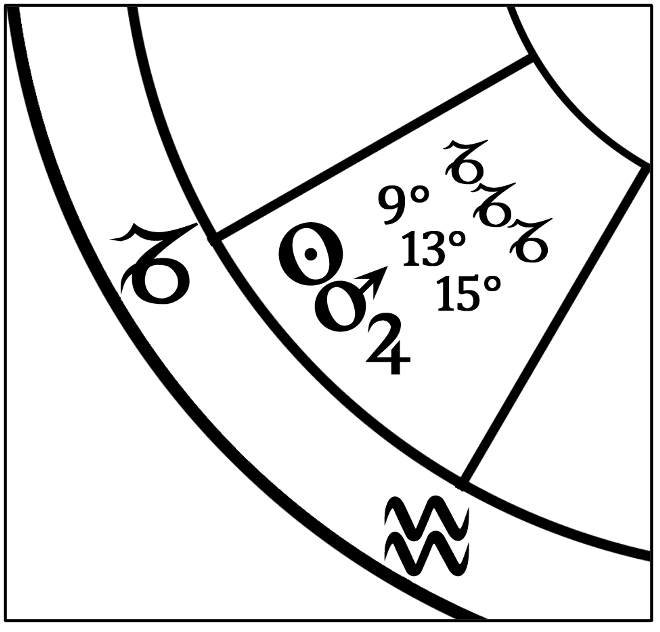Glossary of terms
Special | A | B | C | D | E | F | G | H | I | J | K | L | M | N | O | P | Q | R | S | T | U | V | W | X | Y | Z | ALL
P |
|---|
PeregrineThe word 'Peregrine' comes from a Latin term meaning 'alien' or 'foreigner' (pereger = beyond the borders, ager = land, i.e., 'beyond one's own land'). A planet is defined as peregrine when it has no level of rulership over its position. That is, it is not placed in the sign(s) that it rules, nor those where it is exalted, nor does it rule the triplicity, or the terms or face where it is located. NB: some recent authors wrongly suggest that a planet cannot be peregrine if it is in a sign of debility. This is incorrect - for more on this see 'The Definition of Peregrine' by Deborah Houlding | |
PerfectionFrom the Latin perfectio ‘to complete’. Mainly used in horary astrology, a perfection occurs when the significators for the person asking (querent) and the thing being asked about (quesited) come together by conjunction or major aspect. This shows the thing enquired about as being able to be brought to pass. | |
PhlegmaticOne of the four humours, related to the season of
autumn and the element of water. It denotes a cold and moist temperament and
the word ‘phlegmatic’ is often used to describe someone who is emotionally
sensitive, lacking in active motivation, therefore sluggish in responses and
often having a weak constitution. In physiology the phlegmatic humour is
traditionally reputed to be seated in phlegm, which creates slipperiness to
support the principle of ejection and elimination of processed waste. | |
Planetary hoursEqual divisions of the periods between sunrise and
sunset which results in hours that are usually more or less than 60 minutes.
Each is associated with a planet which acts as a general ruler for the concerns
of that time. | |
Primary motion | |
Prime meridianThe imaginary line passing through the celestial poles
and the equinoxes (where the ecliptic and equator intersect); corresponding to
the line of
longitude that passes through Greenwich, England, which defines the zero point
for terrestrial and celestial longitude. | |
Prime vertical | |
Printable glossaryPrintable glossary of terms (pdf file) | |
ProhibitionWhere two planets are applying to aspect but before the aspect perfects another planet overtakes the first and perfects an aspect with the second.  This diagram shows an example of prohibition by conjunction offered by Bonatti (Dykes, p.221). The Sun seeks to unite with Jupiter, but Mars stands between them, so Mars has the immediate influence, preventing the Sun from securing Jupiter’s full attention. | |
Proportional housesThis refers to a style of chart wheel, sometimes known
as an ‘unequal wheel’. It places the planets and houses against a 360° wheel,
allowing the span of each house to be unequal (and therefore having the
disadvantage of bunching up collections of planets) but allows aspects to be
read with ease. The alternative makes each house the same size and allows an
easy identification of a planet’s house position, but aspects between the
planets are less easy to identify as zodiacal measurement is distorted. | |
Ptolemy - astrologer (c. 100-170 CE)Immensely influential Roman astronomer, astrologer, geographer and scientist who lived in the vicinity of Alexandria, Egypt. He has been called “the most important single figure in the history of astrology, and one of the most important in the history of astronomy” (Robbins, Intro to the English translation; Loeb, 1940). His astronomical textbook, known as Almagest (from the Arabic phrase Al Majesti, ‘The Greatest’) was revered as the ultimate source of reference for astronomers until the 16th century. Ptolemy’s astrological textbook, Tetrabiblos (Gk: ‘Four Books’) also became the standard bearer for subsequent generations and was copied, commented on, paraphrased, and translated into many languages. The Tetrabiblos was largely responsible for laying down the basic precepts of astrology during the Arabic and Medieval periods and was a necessary textbook in some of the finest universities of the Renaissance and early modern Europe. | ||
